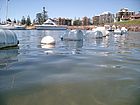GAME Partner institutes / Network
- 42 research partners in 32 countries -
| In the years since GAME was started in 2002, it has built a global network of research institutions. Each year, up to 10 of these institutes can join together to work on a marine ecology issue within the framework of GAME. The scientists based at the institutes supervise the binational teams of students and provide them with the necessary infrastructure. GAME partner institutes can be found in almost all climatic zones and on almost all continents. This allows research results to be compared across climatic and biogeographic boundaries. |
-----------------------------------------------------------------------------------------------------------------------------------

Australia
- Institute: University of Adelaide, Adelaide
Local tutor: Professor Dr. Sean D. Connell
Participation: GAME 2004
Adelaide is located on the southern coast of Australia on the Indian Ocean.
- Institute: University of Tasmania
(Department of Zoology), Hobart, Tasmania
Local tutor: Dr. Alistair Hobday
Participation: project 2006, 2007, 2018 and 2019
Tasmania is an island state whose ecosystem evolved separately from the mainland of Australia (itself a unique ecosystem). It is home to flora and fauna found nowhere else in the world. With the unique ecosystem and natural environment offered by the island state of Tasmania, the university has very strong programs in biology and geography.
- Institute: University of Wollongong, Wollongong
Local tutor: Professor Dr. Andy Davis
Participation: GAME 2005
Wollongong is located approximately 40 miles south of Sydney. The coast is characterized by extended sandy beaches with only few sheltered places. The marina in Wollongong and the Port Kembla harbour provide easily accessible and safe resorts for the deployment of the experimental set-ups.
Last update: March 2022

Brasil
Institute: Universidade Federal Fluminense, Niterói
Local tutor: Professor Dr. Bernardo da Gama
Participation: GAME 2003, 04, 05, 06, 07, 08, 09, 10,11,12,13,14,15, 2018 and 2019
Last update: March 2022
The cities of Rio de Janeiro and Niterói are located at the bay of Guanabara. Due to the high number of people living in this area the waters of the bay are eutrophic. The GAME study site is located on the island of Mocanguê, near the mouth of the bay. A further study site is located 50 miles to the north in Arraial do Cabo where conditions are more natural.

Canada
Institute: Université du Québec à Rimouski, Rimouski
Local tutor: Dr. Philippe Archambault
Participation: GAME 2007, 2008
Last update: March 2022
Rimouski - The University of Rimouski with its associated ISMER (Institute des Sciences de la Mer de Rimouski) marine biological station is located on the southern shore of the Saint Lawrence River, in the Canadian province of Québec. The distance from here to the river’s outlet into the Northern Atlantic is about 300 kilometres. The shore is characterized by bedrock and a considerable tidal range, which results in an ecosystem which offers excellent research opportunities for experimental ecologists. GAME teams working here are tutored by Dr Philippe Archambault.

Cape Verde
Institutes: Universidade de Cabo Verde, Ocean Science Center Mindelo
Local tutors: Dr. Corrine Almeida, Evandro Pires Lopes
Participation: GAME 2018 and 2019
Last update: March 2022
One of the latest members in the GAME network is the Universidade de Cabo Verde. Cabo Verde is an archipelago that consists of 10 volcanic islands and is located 570 km off the West African coast. One campus of the Universidade de Cabo Verde is based on the island of São Vicente in the north of the archipelago, but São Vicente and its capital Mindelo are not only the home of the university, but also of the Ocean Science Centre Mindelo (OSCM). The OSCM was opened in November 2017 and is a joint bilateral initiative of the National Institute for Fisheries Development of the Republic of Cabo Verde and GEOMAR. The OSCM and its laboratory facilities are hosting GAME experiments since 2018.
...................................................................................................................................

Chile
Institute: Universidad Católica del Norte, Coquimbo
Local tutor: Professor Dr. Martin Thiel
Participation: GAME 2003, 2004, 2005, 2006, 2007, 2008, 2010, 2011, 2012, 2013, 2014, 2015, 2017, 2018, 2019
Last update: March 2022
Coquimbo is situated around a circular bay about 500 km north of the capital Santiago de Chile. Due to upwelling processes along the central Chilean coast the system is highly productive.

Croatia
Institute: Meeresschule Pula/ Morska Škola, Pula
Local tutor: Gerwin Gretschel
Participation: GAME 2021, 2022
Last update: March 2022
The Marine School, located in Pula (Croatia-Istria), is a marine biology center that has become a recognized educational and research institution in the European area since its establishment in 2000.
...................................................................................................................................

Egypt
Institute: Alexandria University, Alexandria
Local tutor: Professor Dr. Khadiga Adham
Participation: project 2006
Last update: March 2022
Experiments took place in Alexandria, a city of four millions, in a tranquil part of the harbour. In contrast to the otherwise oligotrophic Mediterranean the whole harbour is highly eutrophised due to numerous sewage dischargers. Aufwuchs-communities therefore grow rapidly and are very productive. The most dominant organism was the tube building worm Serpula vermicularis.











































